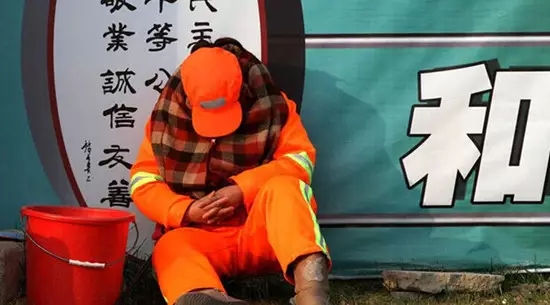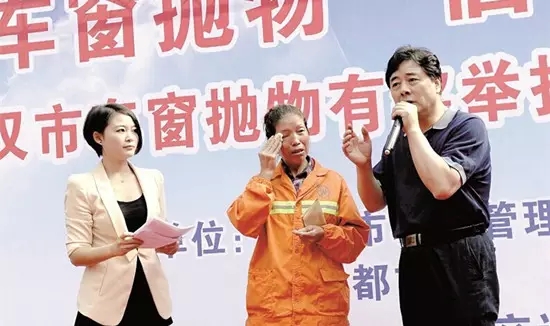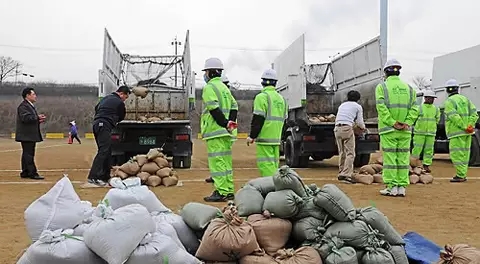Awkward Chinese-style sanitation workers
Sanitation workers often become the center of public opinion, but at the center of public opinion, they are often embarrassing.
This should be the age of enjoyment, but "whiteheaded" carrying his back, doing dirty work in the cityThe cleanliness of urban appearance is a very difficult task. The daily work of a first-line sanitation worker includes: sweeping streets, pedestrians and alleys; clearing garbage from garbage cans and scrubbing rubbish cans; cleaning sewers and ditches to avoid obstruction; Clean up the rubbish on the grassland and keep the grass clean and tidy... This kind of work is not done in one go. The situation of throwing rubbish is “recyclingâ€. The sanitation workers also collect garbage and “recycleâ€, according to the account of the captain of a certain district sanitation bureau in Guangzhou: At 40,000 km of the equator, a sanitation team will make more than two laps around the equator a year.
The ones who have taken on these dirty and dirty jobs are the white-haired people who are supposed to have fun at home and have fun with their grandchildren.
“Old, weak, disabled, and sanitation†is not rare among 70-year-olds in sanitation workers across China. 50-60-year-olds are common, and 40-year-olds are young people. According to a sample survey conducted by the Investigation on the Survival Situation of First-line Sanitation Workers, the first-line sanitation workers in W city of Hubei Province are mainly middle-aged and old people over 40 years old (over 50 years old account for 74.0%), and sanitation workers under 40 years old only account for the survey. 2.1%. The age at which we should have fun is to work in a foreign country where we work in filthy work (most of the sanitation workers come from outside, and the proportion of local sanitation workers in Guangzhou is 8.6%). The large age of sanitation workers makes this unsafe work. Become more dangerous. Take Dalian as an example. Since 2011, sanitation workers have suffered 109 accidents and 17 deaths due to accidents during normal cleaning operations.
It seems that people often get “caringâ€, but they need to get fair job treatment but they don’t get real attention.As the workers on the bottom of the society, the sanitation workers’ associations are met with condolences by leaders at all levels and are invited to dinner or donations by the company's boss. The network will also appear similar to this time. “Let’s throw firecrackers and allow sanitation workers to go home early for the new year. "This kind of "pity the weak to love the people" public opinion carnival.
However, sanitation workers need to receive fair employment treatment but have not received any real attention.
First of all, income and labor are seriously inconsistent. The work of environmental sanitation workers is one of the hardest jobs, and even belongs to high-risk industries. However, the north, Guangshen and other places with high wages are only struggling on the edge of the city's low wage standard line. Taking Guangzhou as an example, the wage rate for sanitation workers on first-line cleaning jobs is about 2,500 yuan per month, of which the job subsidies still maintain the standard of 20 years ago, which is only 5 yuan per day. In the absence of basic guarantees in the work environment, the tools are basically still old - brooms, buckets, shovels, and pushcarts. There isn't even a place to drink water, shelter from the heat, cover the wind, hide the rain, and change clothes. Not to mention social security such as social insurance and regular medical examinations.

Every day must be 12 hours on the pavement to keep the road clean at all times. The sanitation workers can only curl on the road and doze off.
Known as the "city beautician", it is considered by many city people as a "secondary citizen" with no culture, low quality, and dirty appearance.In the various official discourse systems and media contexts, the sanitation workers who work under the hard and dirty work in the glorious city are lovely people who have been given various “beauty†titles. They are “city beauticians†and “road angelsâ€. They should regularly praise the sanitation workers for their touching deeds and give them "red flowers and flowers."
However, in the real environment, the public’s professional dignity for sanitation workers is generally ignored and degraded. The latter is considered to be a "secondary citizen" with no culture, low quality and appearance.
In 2006, "Zhejiang Daily" once published an article titled "The Sanitation Worker Workers Need to Follow and Require Sanitary Workers to Respect." This article reveals the social reality that sanitation workers are "ridiculed and mocked and beaten": a case of serious insults. The average number of environmental sanitation stations (stations) in the province is 5 each year. Since 1996, 924 sanitation workers in Hangzhou have been abused. Ten years have passed and the situation has not changed. The survey data of the National Social Science Fund Project “The Survival Status of Sanitation Workers and Its Influencing Factors†shows that more than 70% of sanitation workers say that they are “discriminated and not respected†because they have encountered difficulties in their lives. Sanitation workers almost all Having suffered physical or verbal injury, the pedestrian's cold eyes are relatively cynic, even vehement, and pedestrians believe that the high status of sanitation workers is only 7.21%.

In October 2014, a female sanitation worker in Wuhan was stunned by the latter when she stopped a parabolic car window. After receiving the report, he received a "Award for Award" of 1,000 yuan.
Skills are at the bottom of the floor, there is no career preparation, and they are not considered as employees of the company.
Underlying sanitation workers no matter how they transform their jobs, due to their skill limitations, they are always at the bottom of their employability skills.
With the acceleration of urbanization, modern cities are no longer the size of the original city, and a large amount of waste needs to be collected and processed. It requires skilled and professional modern sanitation teams. However, in China, academic qualifications for first-line sanitation workers are generally low. According to data provided by Guangzhou Mayor Chen Jianhua in 2013, 90% of sanitation workers in Guangzhou were junior high school or below. The level of education is low. Is there any relevant training for the job before taking up the job? The results were equally disappointing. According to scholar Chen Kezhen's "Survey on the Survival of First-line Sanitation Workers," the number of sanitation workers who have received job training is extremely small, and most of them have not participated in job training.
In fact, China’s sanitation workers are still engaged in the original work of relying on brooms, buckets, shovels, and carts. It also caused the sanitation workers to face bargaining power in the face of this hard and dangerous job. Difficult and prolonged work, the reward is low. And this job will not improve the professional skills of the practitioners. On the contrary, it can be greatly replaced (the circulation rate of sanitation workers in major cities is generally more than 20%). Such a low-level job is of course difficult to attract the younger generation and is also easily overlooked by the public.
As one of the government’s public utilities, the sanitation industry has its own special circumstances.It should be said that with the continuous improvement of the labor legal system, most of the problems in the labor relations field in China are gradually decreasing, and some management blind spots are gradually being resolved. However, as one of the government’s public utilities, the sanitation industry also has its own special circumstances. The existing problems have not been greatly improved.
After 25 years of work, because of his age, sanitation worker Xie Rufan was dismissed by the Environmental Protection Bureau of Changsha City's Furong District. As the sanitation agency did not sign a contract with him during the work period and did not pay social security, Xie Rufan, who was dismissed, had no life protection and was old and had no reason to be. Xie Rufan's old man is not alone, but is a typical experience of environmental protection workers.
In China, the sanitation department exists as a public institution. However, the vast majority of sanitation workers are not regular employees in the establishment, but are extra staff and temporary workers. Take Fujian Province as an example, the number of sanitation workers in Fujian is about 43,000. Formal employees account for 9% of the total number of employees. They are mainly engaged in management and related technical work; 26% of non-staff workers and 65% temporary workers account for cleaning and garbage transfer. And terminal processing and other hard work. Finance is only responsible for a small number of sanitation workers in the establishment. The large number of sanitation workers outside the establishment are basically solved by the outsourcing sanitation companies that undertake the project. The latter tends to refuse workers to join the insurance policy because they are old and the workers are not eligible to pay social security and cannot pay for 15 consecutive years, and even sign a labor contract. These non-staff personnel are neither employees of public institutions nor employees of enterprises, and management creates a vacuum.

Korean environmental sanitation worker candidates receive a number of fitness tests at the examination site, including 100-meter runs, sit-ups, back-bags and 50-meter runs.
How to solve the “identity†of sanitation workers
It is necessary to clean up the identity management mechanism and include all sanitation workers in the labor contract managementThe existence of the sanitation department as a business unit means that the sanitation workers who have been prepared are the “superior people†who eat the royal food. In 2013, Harbin City recruited 448 sanitation workers from all over the country. It attracted 29 graduate students to apply for a job, and 7 of them were eventually selected. “I would die even if I die,†and the so-called professional Development and life value seem pale and powerless.
In most foreign countries, the sanitation department is based on the nature of the employment sector. According to the labor contract law, it is included in the scope of the company's employees. With a clear labor relationship, wages, social security, and benefits can all be solved, and the salary is generous. In the United States, the salaries of cleaners (annual salary) can reach 40,000-50,000 US dollars. In the United Kingdom, sanitation workers are highly paid among ordinary manual workers. According to the Korean “Korean Daily†reported in January 2013, South Korea's Changan City, Changwon City, wanted to recruit 7 sanitation workers, 278 candidates, the competition rate is close to 40:1, of which high education accounted for 44%. However, unlike Harbin’s “attractive†factor, South Korea has high treatment and high benefits under the sanitation quota: sanitation workers can earn more than 32 million won (approximately RMB 180,000 yuan) in annual salary, and retirement is also guaranteed.
If the sanitation department has always existed in public institutions, the limited financial allocations will allow a large number of non-compiling environmental sanitation workers to become institutional cadres within the system, and they will not be included in the scope of the company's employees according to the labor contract law. This kind of ambiguity will continue.
Improve laws and regulations, enhance technological innovation, and build a safeguard system for the sanitation workersIn China today, sanitation workers are low-tech jobs, dispersed jobs, and largely replaced jobs. This is the place where the sunshine of the labor law is difficult to shine. The rights of workers are compared to some enterprises that are considered sweatshops. , more suppressed, how to protect their rights?
First, rely on laws and regulations. Taking the safety of sanitation workers as an example, the state currently does not have a statute on guaranteeing the safety of sanitation workers, sanitation workers’ right to work, sanitation work road rights, how to severely punish the driver after a collision in the operation, and what criteria to give. Compensation and compensation for injured sanitation workers... The relevant departments need to investigate and issue relevant policies as soon as possible. The Hong Kong Public Health and Municipal Services Ordinance clearly stipulates that it is an offence for any person to obstruct the sanctioning of sanitation workers from cleaning up rubbish or depositing items on the road. The court may order the forfeiture of the article, in addition to other punishments.
In addition to legal strength, unions are also essential. In fact, how to protect environmental sanitation workers under the conditions of market conditions, such as low technical content, decentralized jobs, and the interests of the displaced workers, the workers' movement in Western developed countries also face similar challenges. We can learn from the "employment hall" system of the San Francisco Marina Ferry Union and the cleaner union: the union organizes the workers and unionizes all cleaning work in the union-controlled area; every member's information is registered, especially the time of enrollment. This has become the basis for deciding the priority and benefits of income and work arrangements, that is, the foundation of the annual salary system or the seniority system; the trade unions are also responsible for negotiating the level of wages and the level of welfare benefits.
Technological innovations and vocational training must also, at least under the existing conditions, install "old four" warning lights and voice prompts.
Conclusion
This is not the first time that environmental sanitation workers have expressed "love" (whether it is speculation or goodwill), nor will it be the next time. But it is clear that what they need is not such moral and emotional compassion and resonance.

[Garbage truck manufacturers]: http://
[Company Name]: Hubei Runli Special Automobile Co., Ltd.
[Corporate Address]: 77 Century Avenue, Suizhou City, Hubei Province
[Business QQ & WeChat]
[Contact Phone]: 013908662884 Manager Wang
- Pressure washer gun 4000 PSI, with 16 inch pressure washer extension wand and bonus 5 nozzle tips. The water pressure gun features M22-14 thread fitting, an extra M22-15 thread fitting. 1/4 inch quick connection fits for any accessory with 1/4 in plug. Max Temperature of water is rated to 150℃ / 300℉. Max Flow Rate is up to 7 GPM.
- Dual Purpose: The pressure washer gun equipped with M22-14 and M22-15mm fitting. M22-14 fitting: compatible with Briggs Stratton, craftsman, karcher, Generac, Simpson, Ryobi pressure washer. M22-15 fitting: compatible with Sun Joe, AR Blue, Stanley, Campbell, MI-T-M, Cleanforce, Excell, Simoniz power washer. NOT FIT GARDEN HOSE AND WATER HOSE.
- Humanization Design: Assemble long or short Pressure Washer guns according to your needs. Three Length: 40 in, 25 in and 8.8 in. Our replacement pressure washer trigger gun fits most gas and electric pressure washer with M22 fitting. The gun has a safety locking trigger to prevent accidental jets. Handle designed more comfortable and better grip.
- Quick Connect: If hose has M22-14 fitting with 14mm inside diameter, please connect to hose directly. If hose has M22-15 fitting with 15mm inside diameter, please connect the brass coupler firstly. 1/4 inch quick connect fitting, fits most pressure washers. Such as nozzles tips, foam cannon, pivoting coupler, undercarriage cleaner, water broom, surface cleaner and so on.
- 5 Jet Nozzles: With 0°, 15°, 25°, 40°, Soap-degree(65°) jet patterns for a variety of uses, like washing car, washing fence, cleaning sidewalk. 1/4 inch quick connection design, easy to connect to the replacement wand. Suitable nozzles can be selected according to different requirements.
Pressure Washer Wand,Power Washer Wand,Pressure Washer Extension Wand,High Pressure Washer Extension Wand
Ningbo Senmiao Trading Co., Ltd. , https://www.senmiaowasher.com